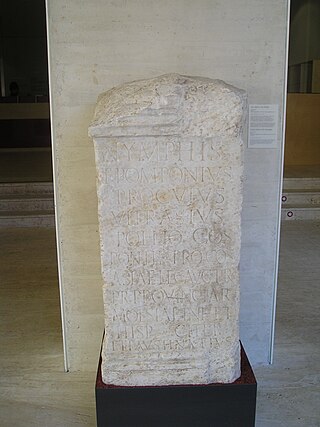Related Research Articles
Gnaeus Julius Verus was Roman senator and general of the mid-2nd century AD. He was suffect consul, and governed several important imperial provinces: Germania Inferior, Britain, and Syria.

Gaius Julius Quadratus Bassus (70–117) was a Roman senator and general. He rose from provincial aristocratic origins to occupy the highest offices of Rome. He served as a legionary commander and as imperial governor of Judea, Cappadoccia, Galatia, Syria and Dacia. He is known to have been active under Trajan in the Dacian and Parthian Wars. Bassus was suffect consul in the nundinium of May to August 105 with Gnaeus Afranius Dexter as his colleague.

Titus Pomponius Proculus Vitrasius Pollio was a Roman senator, who held several imperial appointments during the reign of Marcus Aurelius. He was suffect consul in an undetermined nundinium around 151; he was a consul ordinarius in the year 176 with Marcus Flavius Aper as his colleague.
Lucius Hedius Rufus Lollianus Avitus was a Roman senator and military officer. He was consul in the year 144 as the colleague of Titus Statilius Maximus.
Quintus Antonius Isauricus was a Roman legatus legionis commanding Legio VI Victrix in Britain during the AD 130s under Hadrian. He is attested as later serving as suffect consul in May 140 under Antoninus Pius with Lucius Aurelius Flaccus as his colleague.
Lucius Dasumius Tullius Tuscus was a Roman senator who was an amici or trusted advisor of the emperors Antoninus Pius and Marcus Aurelius. He was suffect consul in the nundinium of April to June 152 AD as the colleague of Publius Sufenas.
Titus Prifernius Paetus Rosianus Geminus was a Roman senator of the second century who held a series of posts in the emperor's service. He was suffect consul for the nundinium of May–June AD 146 as the colleague of Publius Mummius Sisenna Rutilianus.
Lucius Annius Fabianus was a Roman senator and general. He was suffect consul for the nundinium of November–December AD 141; his colleague is not known.
Lucius Burbuleius Optatus Ligarianus was a Roman senator of the second century, who held several offices in the emperor's service. He was suffect consul in the nundinium of May-August 135 as the colleague of Marcus Aemilius Papus. He died while governor of Syria.
Lucius Venuleius Apronianus Octavius Priscus was a Roman senator active during the first half of the second century AD. He was suffect consul around the year 145, then ordinary consul in 168 with Lucius Sergius Paullus as his colleague. Priscus is known only from non-literary sources.
Lucius Novius Crispinus Martialis Saturninus was a Roman senator of the second century. He was suffect consul in either 150 or 151 AD. His life is primarily known from inscriptions.
Marcus Pontius Laelianus Larcius Sabinus was a Roman senator and general who held a series of offices in the emperor's service. He was suffect consul for the nundinium of July-August 145 as the colleague of Quintus Mustius Priscus. Laelianus is primarily known through inscriptions.
Quintus Fuficius Cornutus was a Roman senator active in the first half of the second century AD, who held a number of offices in the emperor's service. He was suffect consul for the nundinium April-June AD 147 with Aulus Claudius Charax as his colleague. Cornutus is known only from inscriptions.
Quintus Camurius Numisius Junior was a Roman senator active during the later second century AD. He was suffect consul for a nundinium in the first half of the year 161 as the colleague of Marcus Annius Libo.
Quintus Cornelius Proculus was a Roman senator, who was active during the middle of the second century AD. He was suffect consul in the nundinium of November–December 146 as the colleague of Lucius Aemilius Longus. Proculus is known entirely from inscriptions.

Titus Caesernius Statianus was a Roman senator who held a number of appointments in the Imperial service during the reigns of Hadrian and Antoninus Pius. He was suffect consul in the nundinium of September-October 141; his colleague's name is not known. His full name is Titus Caesernius Statius Quinctius Statianus Memmius Macrinus.
Titus Caesernius Quinctianus was a Roman senator who held a number of appointments in the Imperial service during the reigns of Hadrian and Antoninus Pius. He was suffect consul in an undetermined nundinium around the year 138. His full name was Titus Caesernius Statius Quinctius Macedo Quinctianus.
Publius Cluvius Maximus Paullinus was a Roman senator, who held a number of imperial appointments during the reigns of Hadrian and Antoninus Pius. He was suffect consul during an undetermined nundinium between 139 and 143. He is known entirely from inscriptions.
Marcus Servilius Fabianus Maximus was a Roman senator, who was active during the reigns of Antoninus Pius and Marcus Aurelius. He was suffect consul in a nundinium in mid-158 with Quintus Jallius Bassus as his colleague.
Marcus Cominius Secundus was a Roman senator, who was active during the reign of Marcus Aurelius. He was suffect consul in one of the later nundinia of 151 with Lucius Attidius Cornelianus as his colleague. He is known from inscriptions and military diplomas issued during his time.
References
- ↑ The spelling Karus is also attested, and preferred by some experts
- ↑ Werner Eck, "Die Fasti consulares der Regierungszeit des Antoninus Pius, eine Bestandsaufnahme seit Géza Alföldys Konsulat und Senatorenstand" in Studia epigraphica in memoriam Géza Alföldy, hg. W. Eck, B. Feher, and P. Kovács (Bonn, 2013), p. 74
- ↑ Most notably, CIL VI, 1333
- 1 2 Klebs 1897, p. 27.
- ↑ Cowan, R. Roman Legionary AD 69-161 (2013), p. 10
- ↑ Birley, The Fasti of Roman Britain, (Oxford: Clarendon Press, 1981), pp. 17f
- 1 2 3 Campbell 2006, p. 62.
- ↑ Géza Alföldy, Konsulat und Senatorenstand unter der Antoninen (Bonn: Rudolf Habelt Verlag, 1977), p. 224 and note